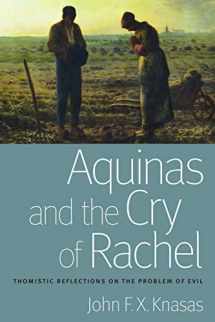
Aquinas and the Cry of Rachel: Thomistic Reflections on the Problem of Evil
ISBN-13:
9780813221762
ISBN-10:
0813221765
Author:
John F. X. Knasas
Publication date:
2013
Publisher:
The Catholic University of America Press
Format:
Hardcover
328 pages
FREE US shipping
Book details
ISBN-13:
9780813221762
ISBN-10:
0813221765
Author:
John F. X. Knasas
Publication date:
2013
Publisher:
The Catholic University of America Press
Format:
Hardcover
328 pages
Summary
Aquinas and the Cry of Rachel: Thomistic Reflections on the Problem of Evil (ISBN-13: 9780813221762 and ISBN-10: 0813221765), written by authors
John F. X. Knasas, was published by The Catholic University of America Press in 2013.
With an overall rating of 4.3 stars, it's a notable title among other
books. You can easily purchase or rent Aquinas and the Cry of Rachel: Thomistic Reflections on the Problem of Evil (Hardcover) from BooksRun,
along with many other new and used
books
and textbooks.
And, if you're looking to sell your copy, our current buyback offer is $0.3.
Description
In Aquinas and the Cry of Rachel , John F. X. Knasas explores Thomas Aquinas's philosophical thinking about evil, and brings the results into discussion with the contemporary theodicies - philosophies of the problem of evil. It examines the relation of the human person and human nature to nature as a whole.
Generally speaking, possible philosophical accounts for evil are two kinds: cosmological or personal. The cosmological account has evils rebounding to the perfection of creation. The personal account would have evils suffered rebounding to the good of the sufferer. Knasas argues that for Aquinas no philosophical resolution of these two kinds of accounts
is possible. This argument is based upon Aquinas's understanding of the human as an intellector of analogical being. Such an understanding establishes two truths. First, the human is by nature only a principal part of the created whole. Second, there is the philosophically discernible possibility of supernatural elevation by the creator.
Hence, as far as philosophy can discern, evil may have a natural explanation or it may have a supernatural one. The Thomistic philosopher has no answer as to why evil exists because that philosopher discerns too many possible ones. In that respect, Aquinas's thinking on evil is similar to his thinking about the philosophical knowledge of the biblical
truth of the world's creation in time. Such a creation is one metaphysical possibility among others. Some authors that Aquinas and the Cry of Rachel considers are: Anthony Flew and Albert Camus, Jacques Maritain and Charles Journet, William Rowe, Marily McCord Adams, William Hasker, John Hick, David Ray Griffin, David Hume, Diogenes Allen, J. L. Mackie, Alvin Plantinga, Richard Swinburne, Bruce Reichenbach,
Brian Davies, and Eleonore Stump.


We would LOVE it if you could help us and other readers by reviewing the book
Book review

Congratulations! We have received your book review.
{user}
{createdAt}
by {truncated_author}


